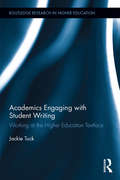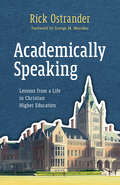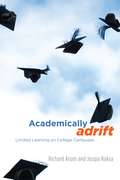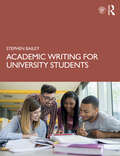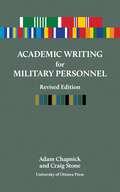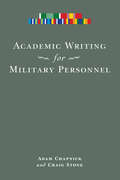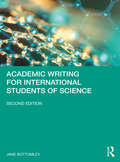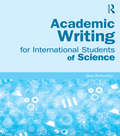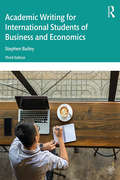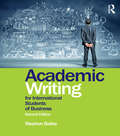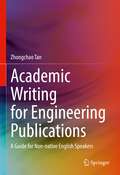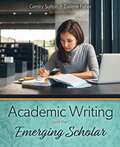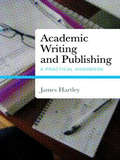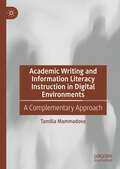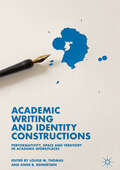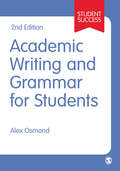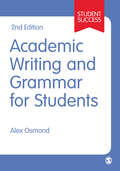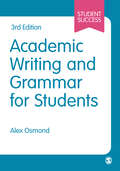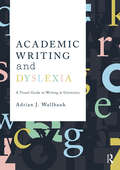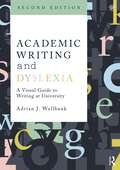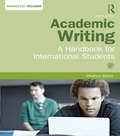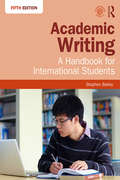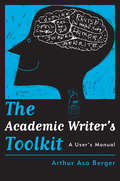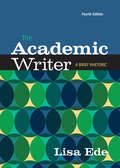- Table View
- List View
Academics Engaging with Student Writing: Working at the Higher Education Textface (Routledge Research in Higher Education)
by Jackie TuckStudent writing has long been viewed as a problem in higher education in the UK. Moreover, the sector has consistently performed poorly in the National Student Survey with regard to assessment and feedback. Academics Engaging with Student Writing tackles these major issues from a new and unique angle, exploring the real-life experiences of academic teachers from different institutions as they set, support, read, respond to and assess assignments undertaken by undergraduate students. Incorporating evidence from post-1992 universities, Oxbridge, members of the Russell Group and others, this book examines working practices around student writing within the context of an increasingly market-oriented mass higher education system. Presenting a wealth of relevant examples from disciplines as diverse as History and Sports Science, Tuck makes extensive use of interviews, observations, texts and audio recordings in order to explore the perspectives of academic teachers who work with student writers and their texts. This book will be of interest to researchers, academics and postgraduate students in the fields of academic literacies, higher education, language and literacy, language in higher education, English for academic purposes and assessment. Furthermore, academic teachers with experience of this crucial aspect of academic labour will welcome Tuck’s pioneering work as an indispensable tool for making sense of their own engagement with student writers.
Academically Speaking: Lessons from a Life in Christian Higher Education
by Rick OstranderA personal odyssey through the world of Christian higher education, narrated by a professional who has worked on both sides of the faculty-administrative divide. What is the world of Christian higher education really like? Rick Ostrander&’s thirty-year career in Christian academia equips him to provide an insider&’s perspective on the field and its future. Ostrander cut his teeth as an undergraduate at Moody Bible Institute and the University of Michigan before completing his PhD with George Marsden at Notre Dame. From there he worked as a professor and administrator at various Christian colleges, a vice president at the Council for Christian Colleges and Universities, and an independent academic consultant. Throughout, he witnessed the many dramatic transformations of Christian higher education. Ostrander traces an attempt to cultivate evangelical intellectualism in the &’90s to the political and economic forces that shake Christian colleges today. Through lively storytelling, Ostrander highlights the qualities and quirks of Christian higher education. His experiences offer readers insight into how Christian colleges can flourish in an age of uncertainty.
Academically Adrift: Limited Learning on College Campuses
by Richard Arum Josipa RoksaIn spite of soaring tuition costs, more and more students go to college every year. A bachelor's degree is now required for entry into a growing number of professions. And some parents begin planning for the expense of sending their kids to college when they're born. Almost everyone strives to go, but almost no one asks the fundamental question posed by Academically Adrift: are undergraduates really learning anything once they get there? For a large proportion of students, Richard Arum and Josipa Roksa's answer to that question is a definitive no. Their extensive research draws on survey responses, transcript data, and, for the first time, the state-of-the-art Collegiate Learning Assessment, a standardized test administered to students in their first semester and then again at the end of their second year. According to their analysis of more than 2,300 undergraduates at twenty-four institutions, 45 percent of these students demonstrate no significant improvement in a range of skills--including critical thinking, complex reasoning, and writing--during their first two years of college. As troubling as their findings are, Arum and Roksa argue that for many faculty and administrators they will come as no surprise--instead, they are the expected result of a student body distracted by socializing or working and an institutional culture that puts undergraduate learning close to the bottom of the priority list. Academically Adrift holds sobering lessons for students, faculty, administrators, policy makers, and parents--all of whom are implicated in promoting or at least ignoring contemporary campus culture. Higher education faces crises on a number of fronts, but Arum and Roksa's report that colleges are failing at their most basic mission will demand the attention of us all.
Academic Writing for University Students
by Stephen BaileyAcademic Writing for University Students is designed to help all students succeed in writing essays, reports and other papers for coursework and exams effectively. Academic writing is often the biggest challenge facing college and university students, but this book provides all the tools needed to master the necessary skills. The book is divided into four parts, to help teachers and students easily find the help they need, both in the classroom and for self-study: The Writing Process: From finding suitable sources, through to editing and proofreading Writing Types: Practice with common assignments such as reports and cause-effect essays Writing Tools: Skills such as making comparisons, definitions, punctuation and style Lexis: Academic vocabulary, using synonyms, nouns, adjectives, verbs and adverbs This key handbook breaks down and practises every stage of essay writing. All units are fully cross-referenced, and a complete set of answers to the practice exercises is included. In addition, the companion website hosts comprehensive teaching notes as well as more challenging exercises, revision material and links to other sources. Designed for self-study as well as classroom use, this book uses authentic academic texts from a range of sources and provides models for common writing tasks such as case studies, while progress checks are included for each part to enable students to assess their learning. Academic Writing for University Students is an invaluable guide to all aspects of academic writing in English.
Academic Writing for Military Personnel, revised edition: Revised Edition (Standalone titles)
by Adam Chapnick Craig StoneAcademic Writing: A Guide for Military Personnel est un manuel de rédaction conçu pour aider le personnel militaire à rédiger des travaux savants dans un style clair et efficace. Fruit de la collaboration entre un professeur d’écriture chevronné et un officier militaire à la retraite, le manuel s’adresse aux membres des forces armées qui rejoignent le monde universitaire et qui ont déjà rédigé dans un contexte professionnel militaire ou qui n’ont aucune expérience de la rédaction. En plus d’enseigner aux officiers comment rédiger efficacement, cet ouvrage explique en quoi la maîtrise des techniques de rédaction est utile au personnel des forces armées dans leurs tâches régulières, en particulier aux échelons supérieurs. L’ouvrage traite de l’importance de savoir communiquer par écrit, de ce qui distingue la rédaction savante de la rédaction professionnelle, des processus de recherche et de rédaction proprement dite, du professionnalisme dans la sphère universitaire ainsi que des problèmes et défis fréquemment rencontrés par les rédactrices et les rédacteurs. Un dernier chapitre novateur traite de la manière dont les officiers peuvent mettre à profit les connaissances qu’ils ont acquises par leurs expériences professionnelles dans le contexte universitaire. Des exemples concrets — à l’usage particulier des militaires — sont présentés tout au long du texte pour guider la lectrice et le lecteur de manière pratique et pertinente.Cette édition révisée comprend de nouveaux exemples provenant d’une plus grande variété d’auteurs. Elle prend en compte l’évolution récente des technologies de communication et reflète les nouvelles avancées dans les domaines de l’enseignement et de l’apprentissage.Cet ouvrage, qui est le seul guide exhaustif sur la rédaction à l’usage du personnel militaire, est un ajout incontournable à la bibliothèque de tout officier militaire où qu’il se trouve et quel que soit son rang.Ce livre est publié en anglais. Note : Une version française de ce livre sera disponible en 2023.Formats disponibles : couverture souple, PDF accessible et ePub accessible
Academic Writing for Military Personnel
by Adam Chapnick Craig StoneAcademic Writing for Military Personnel is written for members of the military who are either new to or re-entering the academic community and who need to familiarize themselves with academic writing. The authors, an experienced writing instructor and a retired military officer, show how persuasive academic writing enhances officers’ effectiveness in their regular duties, especially as they reach more senior levels of service. They explain the differences between staff writing and academic writing, and outline some of the common errors military personnel make when transitioning from one to the other. The book’s chapters outline the value of strong written communication skills, the research process, the writing process, academic referencing, and frequent grammatical and syntactical errors. Specific examples chosen with a military audience in mind are integrated throughout the book to provide the reader with relevant and practical guidance. The book concludes with a discussion on how officers can use the knowledge they have acquired through their professional experiences in their academic work. As the only comprehensive guide to effective academic writing designed specifically for military personnel, this book will be a crucial addition to the libraries of junior and senior officers in militaries worldwide.
Academic Writing for International Students of Science
by Jane BottomleyThis revised and updated second edition is an accessible companion designed to help science and technology students develop the knowledge, skills and strategies needed to produce clear and coherent academic writing in their university assignments. Using authentic texts to explore the nature of scientific writing, the book covers key areas such as scientific style, effective sentence and paragraph structure, and coherence in texts and arguments. Throughout the book, a range of tasks offers the opportunity to put theory into practice. The explorative tasks allow you to see how language works in a real scientific context, practice and review tasks consolidate learning and help you to develop your own writing skills, and reflective tasks encourage you to think about your own knowledge and experience, and bring this to bear on your own writing journey at university. Key features of the new edition include: • Updated content and additional tasks throughout • New chapters, covering writing in the sciences and writing at university • The introduction of reflective tasks • Up-to-date examples of authentic scientific writing Clear, engaging and easy-to-use, this is an invaluable tool for the busy science or technology student looking to improve their writing and reach their full academic potential.
Academic Writing for International Students of Science
by Jane BottomleyAcademic Writing for International Students of Science will help international students to develop their command of academic scientific writing in English. It guides students through the writing process itself, and will help them to produce clear, well-written and well-organised essays and reports. The book covers a range of issues such as how to explain complex ideas clearly and concisely, how to develop a coherent argument, and how to avoid plagiarism by making effective reference to sources. Through detailed analysis of authentic scientific texts, the book will enhance students’ understanding of the nature of academic scientific writing. This will enable them to understand how language and discourse function in a real scientific context. The texts serve as models of good writing and are followed by practice activities which will help students to develop their own writing skills. Key topics include: the writing process; academic scientific style; sentence structure; paragraph development; referring to sources; coherence, argument and critical thinking; academic and scientific conventions. This book will be an invaluable companion to those studying for a science or technology degree in an English-speaking institution. Informative study boxes, model answers and a clear, comprehensive answer key mean that the book can be used for self-study or with guidance in the classroom.
Academic Writing for International Students of Business and Economics
by Stephen BaileyThe third edition of Academic Writing for International Students of Business and Economics is written to help international students succeed in writing essays, reports and other papers for their English-language academic courses. Thoroughly revised and updated to reflect issues such as diversity and sustainability, this book is designed to let students and teachers easily find the help they need, both in the classroom and for self-study. The book is divided into five parts, comprising a total of 42 units: The Writing Process Elements of Writing Language Issues Vocabulary for Writing Writing Models New topics in this edition include Writing in Groups, Written British and American English and Reflective Writing. In addition, the new interactive website has a full set of teaching notes as well as more challenging exercises, revision material and links to other sources. Additional features of the book include: Models provided for writing tasks such as case studies and literature reviews Use of authentic academic texts from a range of sources Designed for self-study as well as classroom use Useful at both undergraduate and postgraduate level A complete set of answers to the practice exercises Cross-references across all units Providing a glossary to explain technical terms and written to deal with the specific language issues faced by international students of Business and Economics, this practical, user-friendly book is an invaluable guide to academic writing in English.
Academic Writing for International Students of Business
by Stephen BaileyInternational students of Business or Economics often need to write essays and reports for exams and coursework, and this new, second edition of Academic Writing for International Students of Business has been completely revised and updated to help them succeed with these tasks. This book explains the academic writing process from start to finish, and practises all the key writing skills in the context of Business Studies. The book can be used either with a teacher or for self-study, and is clearly organised into four parts, with each divided into short units that contain examples, explanations and exercises for use in the classroom or for self-study: The Writing Process, from assessing sources to proofreading Elements of Writing, practising skills such as making comparisons Vocabulary for Writing, dealing with areas such as nouns and adjectives, adverbs and verbs, synonyms, prefixes and prepositions, in an academic context Writing Models, illustrating case studies, reports, longer essays and other key genres This is an up-to-date book that reflects the interests and issues of contemporary Business Studies, with revised exercises, updated reading texts and a new glossary to ensure accessibility and maximise usability. Students wanting to expand their academic potential will find this practical and easy-to-use book an invaluable guide to writing in English for their degree courses, and it will also help students planning a career with international companies or organisations, where proficiency in written English is a key skill. All aspects of writing clearly explained, with full glossary for reference Full range of practice exercises, with answer key included Use of authentic academic texts Fully updated, with sections on finding electronic sources and evaluating internet material
Academic Writing for Engineering Publications: A Guide for Non-native English Speakers
by Zhongchao TanThis textbook is designed for non-native English speakers who need to write scientific and engineering research articles, technical reports, engineering thesis, academic books, and other technical documents in English. The author focuses on formal academic writing in a professional language and frame. The book is written in standard English and provides useful guidelines on development of thoughts, organization of ideas, construction of paragraphs and sentences, and choices of precise words. It also pays attention to details such as visual creation, punctuation, and format. Informal writing is excluded from the scope of this practical guideline.
Academic Writing and the Emerging Scholar
by Gentry Sutton Dalene FisherAcademic Writing and the Emerging Scholar is an accessible, straightforward text that introduces first-year college students to the fundamentals of beginning composition. All four of its main sections are highly practical, and the authors have designed a number of learning activities that can serve as homework assignments, in-class exercises, or classroom-discussion facilitators. The book’s section on the basics of composition contains annotated example essays, and its MLA section conveniently combines in-text citation examples and corresponding bibliographic examples. Academic Writing and the Emerging Scholar is a concise text that does not distract first-year students with a lot of “extra” information. Rather, its focus is on fundamental concepts and mechanics that are requisite to higher-level writing courses.
Academic Writing and Publishing: A Practical Handbook
by James HartleyAcademic Writing and Publishing will show academics (mainly in the social sciences) how to write and publish research articles. Its aim is to supply examples and brief discussions of recent work in all aspects of the area in short, sharp chapters. It should serve as a handbook for postgraduates and lecturers new to publishing. The book is written in a readable and lively personal style. The advice given is direct and based on up-to-date research that goes beyond that given in current textbooks. For example, the chapter on titles lists different kinds of titles and their purposes not discussed in other texts. The chapter on abstracts instructs the reader on writing structured abstracts from the start.
Academic Writing and Information Literacy Instruction in Digital Environments: A Complementary Approach
by Tamilla MammadovaThis book offers an interdisciplinary approach to the teaching of academic writing and information literacy in a new digital dimension, drawing on recent trends towards project-based writing, digital writing and multimodal writing in Education, and synthesising theory with practice to provide a handy toolkit for teachers and researchers. The author combines a practical orientation to teaching academic writing and information literacy with a grounding in current theories of writing instruction in the digitalized era, and argue that as digital environments become more universal in modern society - particularly in the aftermath of the coronavirus pandemic - the lines between traditional academic writing and multi-modal digital writing must necessary become blurred. This book will be of use to teachers and instructors of academic writing and information literacy, particularly within the context of English for Academic Purposes (EAP), as well as students and researchers in Applied Linguistics, Pedagogy and Digital Writing.
Academic Writing and Identity Constructions: Performativity, Space And Territory In Academic Workplaces
by Louise M. Thomas Anne B. ReinertsenThis book presents multiple cultural and contextual takes on working performances of academic/writer/thinker, both inside and outside the academy. With worldwide, seismic shifts taking place in both the contexts and terrains of universities, and subsequently the altering of what it means to write as an academic and work in academia, the editors and contributors use writing to position and re-position themselves as academics, thinkers and researchers. Using as a point of departure universities and academic/writing work contexts shaped by the increasing dominance of commodification, measurement and performativity, this volume explores responses to these evolving, shifting contexts. In response to the growing global interest in writing as performance, this book breaks new ground by theorizing multiple identity constructions of academic/writer/researcher; considering the possibilities and challenges of engaging in academic writing work in ways that are authentic and sustainable. This reflective and interdisciplinary volume will resonate with students and scholars of academic writing, as well as all those working to reconcile different facets of identity.
Academic Writing and Grammar for Students (SAGE Study Skills Series)
by Alex OsmondAvailable as an E-Inspection Copy! Go here to order Grappling with grammar? Struggling with punctuation? Whether you're writing an essay or assignment, report or dissertation, this useful guide shows you how to improve the quality of your work at university – fast – by identifying and using the correct use of English grammar and punctuation in your academic writing. Using tried and tested advice from student workshops, Alex Osmond shares practical examples that illustrate common mistakes, and shows you how to avoid them. You’ll also discover guidance on: Writing structure – the what and how of crafting sentences and paragraphs Conciseness – how to express your point succinctly and clearly, showing you understand the topic Effective proofreading – the importance of the final ‘tidy up’, so your work is ready to hand in Referencing – common systems, and how to reference consistently (and avoid plagiarism). This new edition also includes separate chapters on critical thinking and referencing, exploring each topic in more detail, and learning outcomes in every chapter, so you can identify what new skills you’ll take away. Personal tips and advice direct from Alex Osmond For access to additional resources and one-to-one advice from Alex, 'like' his Facebook page Academic Writing and Grammar for Students. SAGE Study Skills are essential study guides for students of all levels. From how to write great essays and succeeding at university, to writing your undergraduate dissertation and doing postgraduate research, SAGE Study Skills help you get the best from your time at university. Visit the SAGE Study Skills hub for tips, resources and videos on study success!
Academic Writing and Grammar for Students (SAGE Study Skills Series)
by Alex OsmondThis handy guide shows students how to use academic English grammar and punctuation. The author identifies common grammar mistakes and how to avoid them, making extensive use of examples and advice from tutors from a range of subjects. This valuable book enables readers to immediately improve their work at university.<P> Inside, you will find practical advice on:<P> * common mistakes<P> * punctuation<P> * conciseness<P> * proofreading<P> * referencing<P> * and more.<P> The advice in the book has been tried and tested through workshops that the author runs with students. It will be useful to undergraduates on a wide range of courses, and will help promote independent learning as well as practical writing skills.
Academic Writing and Grammar for Students (Student Success)
by Alex OsmondFrom grammar and punctuation, to proofreading and fixing mistakes, this is your one-stop guide to improving your academic writing to achieve better grades at university. Including quotes from tutors and examples of good and bad practice, this book provides step-by-step guidance on Basic conventions of academic writing Critical thinking Conciseness and clarity Proofreading and referencing Common mistakes and how to avoid them. Student Success is a series of essential guides for students of all levels. From how to think critically and write great essays to boosting your employability and managing your wellbeing, the Student Success series helps you study smarter and get the best from your time at university.
Academic Writing and Grammar for Students (Student Success)
by Alex OsmondFrom grammar and punctuation, to proofreading and fixing mistakes, this is your one-stop guide to improving your academic writing to achieve better grades at university. Including quotes from tutors and examples of good and bad practice, this book provides step-by-step guidance on Basic conventions of academic writing Critical thinking Conciseness and clarity Proofreading and referencing Common mistakes and how to avoid them. Student Success is a series of essential guides for students of all levels. From how to think critically and write great essays to boosting your employability and managing your wellbeing, the Student Success series helps you study smarter and get the best from your time at university.
Academic Writing and Dyslexia: A Visual Guide to Writing at University
by Adrian J. WallbankThis book presents a unique visual approach to academic writing and composition specifically tailored to the needs of dyslexic students in higher education. Readers will learn to successfully structure and articulate their ideas, get to grips with critical reading, thinking and writing, and fulfil their full academic potential. The ‘writing process’ is demystified and techniques for writing compelling, insightful and mark generating essays are conveyed via innovative and meaningful representations, templates, images, icons and prompts, specifically designed to meet the visual and ‘big picture’ strengths of dyslexic learners. A companion website offers supplementary exercises, examples, videos and a full range of downloadable templates and bookmarks. Written by a dyslexic for dyslexics, Academic Writing and Dyslexia is underpinned by extensive research. As a dyslexic student you will learn to present your thoughts with confidence, critically evaluate competing arguments and gain top marks. The book will help you bridge the gap between your existing coping strategies and the increased demands and rigours of academic writing at university. It will be an invaluable resource for dyslexic students, academics, dyslexia specialists, learning developers and writing tutors throughout the higher education sector.
Academic Writing and Dyslexia: A Visual Guide to Writing at University
by Adrian J. WallbankFully revised and expanded, this book presents a unique visual approach to academic writing and composition tailored to the needs of students with dyslexia in Higher Education. It will help you to successfully structure and articulate your ideas, get to grips with critical reading, thinking and writing and fulfil your full academic potential. The ‘writing process’ (e.g. genre and style, critical thinking and reading, writing, sentence construction, and proofreading editing) is de-mystified and translated into innovative, meaningful visual representations in the form of templates, images, icons and prompts designed to meet the visual and ‘big picture’ learning styles and strengths of your dyslexia. Underpinned by extensive research, this book will help you to present your thoughts and evaluate and critique competing arguments in a compelling way. It is written to help you bridge the gap between your existing coping strategies and the increased demands and rigours of academic writing at university. This second edition features enhanced visual techniques for reading online, expanded material to cover scientific writing, literature reviews, reflective writing and academic style, and detailed explanations of how dyslexia affects writing, how to reduce pressure on your working memory and how to get your creativity and ideas onto the page in order to excel. This book serves as an invaluable resource for dyslexic students, academics, dyslexia specialists, learning developers, and writing tutors throughout the Higher Education sector.
Academic Writing: A Handbook for International Students
by Stephen BaileyMost international students need to write essays and reports for exams and coursework, but writing good academic English is one of the most demanding tasks students face. This new, fourth edition of Academic Writing: A Handbook for International Students has been completely revised to help students reach this goal. The four main parts of Academic Writing are: The writing process Elements of writing Vocabulary for writing Writing models Each part is divided into short units which contain examples, explanations and exercises, for use in the classroom or for self-study. The units are clearly organised to allow teachers and students find the help they need with writing tasks, while cross-referencing allows easy access to relevant sections. In the first part, each stage of the writing process is demonstrated and practised, from selecting suitable sources, reading, note-making and planning through to re-writing and proof-reading. The fourth edition of this popular course builds on the success of the earlier editions, and has a special focus on the vital topic of academic vocabulary in part three, Vocabulary for Writing. Part three deals with areas such as nouns and adjectives, adverbs and verbs, synonyms, prefixes and prepositions, in an academic context. More key features of the book include: All elements of writing are clearly explained, with a full glossary for reference Models provided for all types of academic texts: essays, reports, reviews and case-studies Full range of practice exercises, with answer key included Use of authentic academic texts A companion website offers further practice with a range of additional exercises Fully updated, with sections on finding electronic sources and evaluating internet material All international students wanting to maximise their academic potential will find this practical and easy-to-use book an invaluable guide to writing in English for their degree courses.
Academic Writing: A Handbook for International Students
by Stephen BaileyNow in its fifth edition, Academic Writing helps international students succeed in writing essays and reports for their English-language academic courses. Thoroughly revised and updated, it is designed to let teachers and students easily find the topics they need, both in the classroom and for self-study. The book consists of five parts: The Writing Process Elements of Writing Language Issues Vocabulary for Writing Writing Models The first part explains and practises every stage of essay writing, from choosing the best sources, reading and note-making, through to referencing and proofreading. The four remaining parts, organised alphabetically, can be taught in conjunction with the first part or used on a remedial basis. A progress check at the end of each part allows students to assess their learning. All units are fully cross-referenced, and a complete set of answers to the practice exercises is included. New topics in this edition include Writing in Groups, Written British and American English, and Writing Letters and Emails. In addition, the new interactive website has a full set of teaching notes as well as more challenging exercises, revision material and links to other sources. Additional features of the book include: Models provided for writing tasks such as case studies and essays Use of authentic academic texts from a wide range of disciplines Designed for self-study as well as classroom use Useful at both undergraduate and postgraduate level Glossary to explain technical terms, plus index Written to deal with the specific language issues faced by international students, this practical, user-friendly book is an invaluable guide to academic writing in English.
The Academic Writer's Toolkit: A User’s Manual
by Arthur Asa BergerBerger’s slim, user-friendly volume on academic writing is a gift to linguistically-stressed academics. Author of 60 published books, the author speaks to junior scholars and graduate students about the process and products of academic writing. He differentiates between business writing skills for memos, proposals, and reports, and the scholarly writing that occurs in journals and books. He has suggestions for getting the “turgid” out of turgid academic prose and offers suggestions on how to best structure various forms of documents for effective communication. Written in Berger’s friendly, personal style, he shows by example that academics can write good, readable prose in a variety of genres.
The Academic Writer: A Brief Rhetoric, 4e
by Lisa EdeThe Academic Writer is a brief guide that prepares students for any college writing situation through a solid foundation in rhetorical concepts. By framing the reading and composing processes in terms of the rhetorical situation, Lisa Ede gives students the tools they need to make effective choices. With an emphasis on analysis and synthesis, and making and supporting claims, students learn to master the moves of academic writing across mediums. A new chapter on "Strategies for Multimodal Composing" and advice on writing in a multimodal environment throughout the text help instructors take students into new contexts for reading and composing. New coverage of drafting, editing, and revising, and updated coverage of academic research--including the 2016 MLA guidelines--ensures that students are supported at all stages of the writing process.
